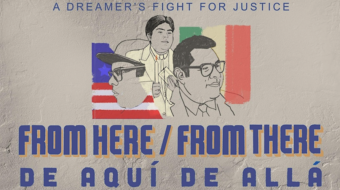
On July 4th, people from the Atlantic to the Pacific take time off from work, host cookouts, relax. They wave flags and watch fireworks displays, or maybe light their own. They contemplate America, and what it means to be an American.
It’s a time to think about what we got right since 1776: the idea that a king was unnecessary, that people can rule themselves, that all people should be free, that the most perfect relationship between one human and another is that of equality – these are all very American ideas. Of course, it’s taken time to incorporate them – and a civil war, a civil rights movement, a women’s rights movement – and we are still very much a work in progress. But “progress” is the key word.
Unfortunately, it’s impossible to overlook, even for the day, all the injustices still wrought in America, especially over immigration. Perhaps that is because this topic cuts to the very chase of what the day celebrates, the meaning of “American.”
Who could be more anti-American than those who seek to keep at least 11 million people, undocumented immigrants, away from the fruits of equality that were fought for by generations of Americans – most of whom came from immigrant stock?
This country has always been, and will always continue to be, a nation of immigrants. The first to arrive came from Asia, across what was then the Bering land bridge, thousands of years ago. The first Europeans – the most illegal immigrants of all – were the British, French, and Spanish settlers. After the U.S. was established, the idea of a “city on the hill” where people from all nations could come in search of a better life came to be. And people came. They were oppressed and usually bitterly poor, but they worked hard and eventually came to be accepted.
It’s not entirely coincidence that the McCarthy period, one of the darkest times for liberty and democracy of the 20th century, overlapped with the period during which the fewest immigrants arrived at our borders.
Racist laws in the early 20th century established nationality quotas on immigration, banning Asians and Africans, effectively shutting the borders. During the time of the civil rights movement, when America started to more fully embrace its promise, immigration restrictions were eased. The 1965 Immigration and Nationality Act removed restrictions on Asian and African immigration, allowing equal numbers to come from each country, as well as providing for family reunification.
This is exactly what the American idea demands: it’s even inscribed on the Statue of Liberty.
Since then our nation – and what we mean when we use the pronoun “our” – has changed dramatically. It has become far less European. Latinos became the fastest growing part of our population – only recently edged out by Asians. Now, the majority of babies born in the U.S. are “non-white.”
Each group that comes brings its own traditions, beliefs, understanding of the world, and many of these eventually become part of and enrich our national culture. For example, spaghetti, Guinness, tacos, café cubano, eggrolls and sushi are now all part of our multi-ethnic American cuisine.
There are those who want to try to stop this. They want to keep out the millions of people looking to come here, to work hard and make a better life for themselves – and, in the process, for the rest of us, both culturally and economically.
The vast majority of the millions of immigrants, documented or not, still believe in the idea that if you work hard – and fight – you can and should make it. Why else would they have come? The DREAMers – young people who have put in countless hours studying and graduating from high school and college – and their families, embody what it means to be an American.
To truly celebrate Independence Day, we should honor them. And fight for them, for ourselves.
Video: Immigraniada, by Gogol Bordello. With members from Ukraine, Russia, Ethiopia, Japan, Ecuador and elsewhere, the band could likely only have formed in America. Photo via SEIU.











Comments